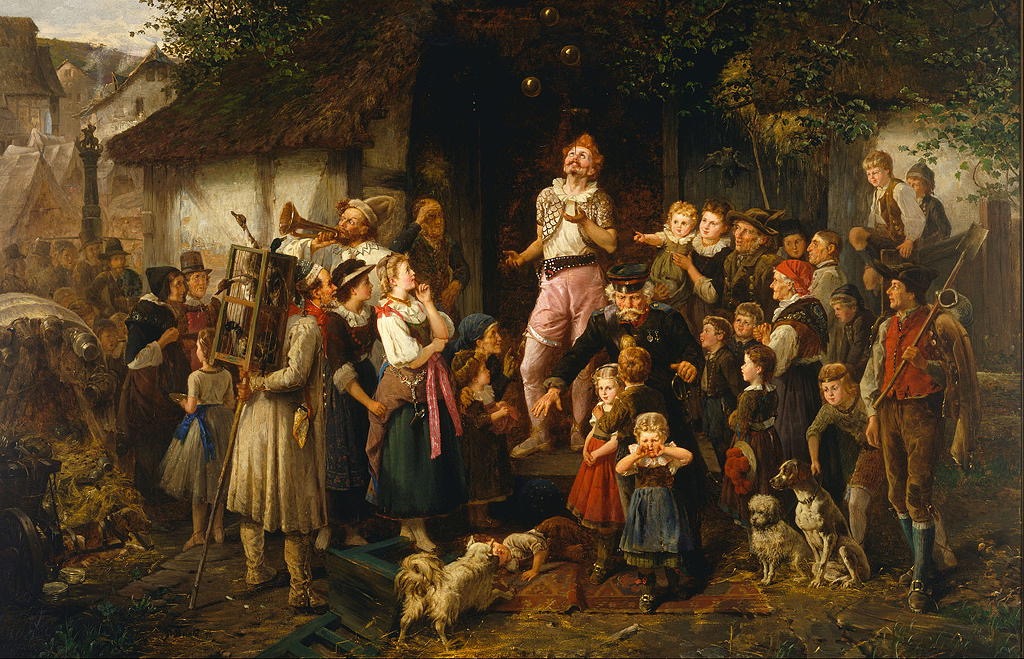Juggling

Fritz Beinke: Der Jongleur [The Juggler: A Village Fair] (1873)
" … some soul-crushing effort."
Juggling separates writing from Authoring. Writing can occur within a variety of mediums. One need not know how to use Microsoft Word to write, as I daily demonstrate. Indeed, some of our most celebrated writers employ pencil and paper to craft their works, but since published works almost never simply photocopy an author's scribblings, some transformation from the original must occur and this does not happen without expending considerable energy, either the author's or someone else's. Indeed, each transformation, each shift of medium, also demands a proofreading pass, this usually requiring a higher skill level than the one performing the migration between mediums. Even moving writing between one software application and another introduces considerable complication into manuscript creation, since different apps tend to interpret the same intentions differently, producing formatting nightmares. I have yet to discover a single application that satisfies all the different demands a single manuscript must satisfy to pass muster, so the writer, or his staff, must engage in considerable and prolonged Juggling to produce a passable manuscript. ©2021 by David A. Schmaltz - all rights reserved
Writers as a class despise Juggling their work product. For some, it seems like an act of necrophilia, a fiddling with the dearly departed. For others, it represents pure tedium, for Juggling does not fall within even the broader definitions of creative act. It involves endless repetition, rote manipulation, mindless action. It tends to hypnotize, producing the sort of action where one often awakens after an hour to discover that they've just introduced a mindless error into everything transferred during that session. Then, the backtracking to find the first instance of that bungle, then the awkward forward effort to find and correct all of its brethren. One can spend an entire afternoon juggling and feel no further forward or behind than when he started. It tends to feel like futile effort and us writers tend to avoid it. We're not shirking, just working up the courage or, more likely the foolhardiness, to act.
Once the transformation's complete, then two versions of that work exist, one in English and another in Reverse Polish notation, the medium transferred into, almost always being written in something other than the writer's native application language. For me, an application called Scrivener serves as that secondary medium. It was never intended to be used as a word processor, so it was deliberately not intended to be any writer's primary medium. Its sole purpose seems to be to allow the organization of material into manuscript form, providing for consistent formatting across an entire work's chapter headings, text bodies, even footnotes and page numbering. To achieve this end, I must copy and paste at least ninety separate documents per manuscript, and each document, I must copy and paste in at least three separate operations. Accounting for errors in formatting, this Juggling might require a day of focus or more than a week. Because it's not my native application language, I must relearn it from scratch every time I use it.
Once the manuscript's supposedly formatted, it must be reviewed, first to confirm that formatting consistency's occurred—it never has—and then for a half dozen other picky little attributes like chapter headings and page numberings. Then the manuscript, something on the order of two hundred pages, needs to be read as a whole, though not, gratefully, in one sitting. This might take another week of effort, because reading one's own work might qualify as the least satisfying sort of effort. What might have seemed brilliant when creating, eventually sums to nothing, which discourages the budding author. He asks, "If I cannot keep myself enthralled, how can I expect to enthrall any others?" He cannot answer that question. He never will.
The corpse will have performed a seeming thousand dances with innumerable partners before its published. It will be a wonder the words have not been stared off the pages by then and its contents will no longer seem in any way new or fresh or insightful. The writer might find a seat somewhere near the back of the theater as the book's released into the world. Then, humiliation not yet complete, the writer, that budding author, will be called upon to promote the work largely juggled to death for him by then.
Will it be foolhardiness or courage, dedication or something else that might propel our writer a little further toward Authoring? He knows he faces some juggling and he needs something to propel him into starting the perpetual momentum of it. He can juggle just fine and he knows it, but does he want to make such a spectacle of himself again? Can he tolerate the tedium? What others perceive as skill, he understands to be rote repetition. The first pass demanded learning. Each subsequent one just wanted repeat performances. The path toward Authoring demands some soul-crushing effort.


